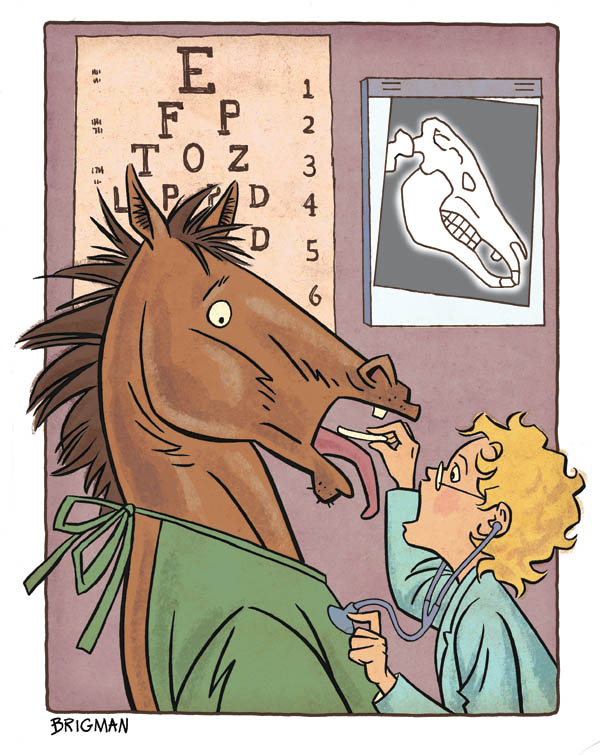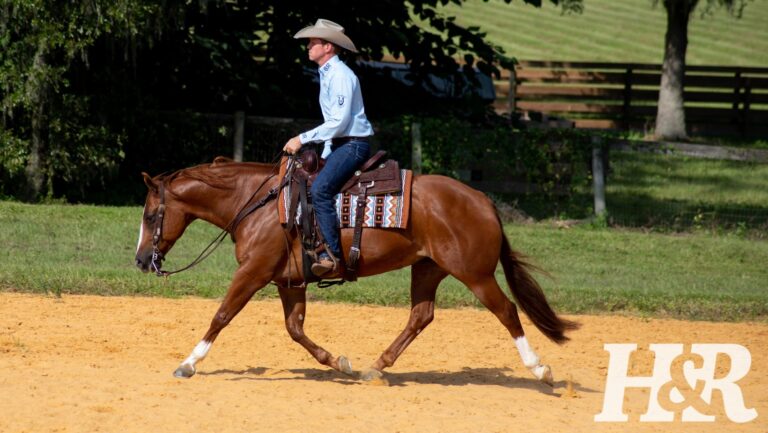I’m chatting with the ophthalmologist about a complicated case of uveitis when a call comes through from the radiologist. She reports her opinion about a recent pre-purchase exam. No sooner have I hung up the phone, than the surgeon returns my call about scheduling an operation to remove an ovarian tumor. Some days I feel more like an air traffic controller than a veterinarian!

As an equine practitioner, I often spend hours a day making all the connections my clients need with other care providers. Frustrating? Sometimes. But if I weren’t doing that, I wouldn’t be providing the best possible care for my equine patients.
In this article, I’m going to help you understand why “one-stop shopping” may no longer be the answer to your horse’s health-care needs. I’ll explain what veterinary specialists are, and the most common roles they’re likely to play in your horse’s life. You’ll learn why it’s so important that a good general practitioner be good at more than designing an effective preventive health-care program or diagnosing and treating your horse when things go wrong.
In fact, you’ll see how your horse’s health may depend on your vet being willing and able to recognize when someone else might do a better job.
SPECIALIST, DEFINED
All veterinarians graduate from veterinary school with a degree that allows them to practice medicine. A true veterinary specialist is someone who’s had additional training in a specific area, beyond the four years spent in veterinary school. In addition to as many as four years of additional training, to become board certified in a specific veterinary specialty, these veterinarians are required to pass rigorous testing as well as publish articles in scientific journals. The American Veterinary Medical Association recognizes more than 20 official veterinary specialties.
Not only do specialists have additional training and credentials, they also usually really “specialize” in practice, meaning they only see specific types of cases. That means they have more experience, and often better tools than your regular vet. Who would you want performing a difficult surgery on your horse? A board-certified surgeon who does that same surgery several times a week and has the latest-model surgery table? Or a veterinarian who’s done it twice?
Board certification in a specialty guarantees a certain level of training—that’s a given. Where it becomes more difficult to navigate the world of horse health care is when it comes to veterinarians who have a certain emphasis in practice, yet aren’t officially “specialists.” This commonly occurs in the performance horse world, where many veterinarians emphasize lameness work. Although they might be lacking the official paperwork, the most skilled of these practitioners have also pursued years of additional training, have more experience, and are better equipped than the average general practitioner.
EQUINE SPECIALTIES
Here’s a rundown of the five most common areas of specialized care you’re likely to encounter in your horse life.
Radiology
The specialist: A radiologist typically spends his days interpreting radiographs, as well as reviewing images from ultrasounds or MRIs. In some situations, a radiologist may be on site, most commonly performing ultrasound exams where “hands on” makes a difference.
You’ll need one when: Your general veterinarian may recommend submitting radiographs to a radiologist for review if he has questions about a specific finding. A radiologist who sees hundreds of films each week often can help decide whether a bone chip is old or new, or whether a “funny looking” line is a fracture or something insignificant. A radiologist often will review radiographs for pre-purchase examinations, and may have an opinion about whether certain findings are likely to affect the horse’s future soundness.
If your horse requires an ultrasound examination to evaluate a tendon or joint problem, a radiologist may be called upon for difficult-to-image areas. Ultrasound is an area where non-board-certified practitioners who have extensive training and experience also may have the expertise you need.
Surgery
The specialist: A surgeon performs life-saving colic operations, repairs fractures, removes bone chips, and sutures difficult wounds. Some surgeons emphasize soft-tissue surgery or orthopedics, while others perform all different types of procedures.
You’ll need one when: Perhaps the most common time that you’ll encounter a surgeon in your horse life is if your horse has a colic episode that requires surgery to resolve. You also may need a surgeon to correct an orthopedic problem. Many general practitioners do perform some surgeries, and are quite skilled and well-equipped for certain things. For more complicated procedures, your regular vet should recognize when surgical referral would be advised.
Ophthalmology
The specialist: An ophthalmologist specializes in care of the eyes. He’ll usually examine your horse in person, perform diagnostic tests, and recommend a treatment plan. He also performs surgery on eyes, such as cataract removal.

You’ll need one when: Your general veterinarian usually will recommend an ophthalmologist if your horse has a serious injury or a problem that isn’t responding well to treatment, such as an infected corneal ulcer or serious trauma. He also may want an ophthalmologist involved if your horse has a chronic problem, such as equine recurrent uveitis, that requires ongoing care. If your horse has a problem that requires surgery on his eye, the ophthalmologist (rather than a surgeon) is likely to perform it.
Dermatology
The specialist: A dermatologist specializes in skin diseases. In veterinary medicine, a dermatologist also fills the role of allergist. He’ll perform skin testing and formulate the serum used for hyposensitization (allergy shots).
You’ll need one when: You’re most likely to require the help of a dermatologist if your horse has chronic hives. He might also be called to help diagnose and treat an unusual skin disease, or manage medications for a chronic skin-related problem.
Lameness
The specialist: Although lameness typically falls under the surgery specialty for board certification, many veterinarians who emphasize lameness diagnostics and treatment in their practice aren’t true “specialists.” A lameness expert typically sees horses with complicated or difficult-to-diagnose problems, and often has more advanced diagnostic tools available, such as nuclear scintigraphy or MRI. He may have additional training skills when performing ultrasounds. He’ll be capable (and experienced) when performing a wide variety of treatments, such as complicated joint injections, or such regenerative therapies as platelet-rich plasma or stem-cell treatments.
You’ll need one when: Your vet will recommend referral to a lameness expert if your horse has a problem that’s proved difficult to diagnose or has failed to respond to treatment. He also may refer you for specific diagnostic tests, such as a nuclear scintigraphy of MRI, that aren’t available in a general practice. You may need the assistance of a lameness expert to perform a pre-purchase examination, particularly if you’re spending big bucks on a high-level performance horse.
MAKING THE MOST OF SPECIALIZED MEDICINE
With all these options available, it’s easy to see why single-vet care really isn’t the answer any more. It’s also easy to understand why it’s tempting to seek out specialized help for every problem. To make the most of specialized care, keep these few simple rules in mind.
Work with your vet. It’s always best to keep your own veterinarian involved with your horse’s care, even as you seek specialized help. If your vet recommends referral, take his suggestions. Even more important, if you’re the one requesting a second opinion, it’s always best to ask your regular vet for input and advice. Your vet knows you and your horse well, and has your best interests at heart. He can share your horse’s history and is likely to be connected to all the best specialists (and know who to avoid!). As the director at the hub of your health-care team, this person can help you make all the right decisions to protect your horse’s health.
Don’t wait too long. Nothing is more frustrating for a specialist than to first see your horse when he’s too sick or lame to be helped—especially if that disease or lameness could have been diagnosed and cured in its early stages. Once again—if your own vet recommends referral, take his advice. And if you feel like you haven’t really figured out what’s wrong, or that your horse isn’t responding well to treatment, ask your vet whether referral options exist that might help. Remember, your vet is probably the best person to help you find qualified, reliable opinions, so don’t make the mistake of seeking advice from unqualified or self-proclaimed “experts,” only to find that you aren’t really getting what you need.
Check out credentials. Just because someone claims to be an expert doesn’t mean he has the training or skills to support those claims. Even if this person has a glossy Web site or is popular in the local barns, that’s no guarantee he can provide the help your horse requires. Look for board certification as an indicator that the practitioner has indeed had specialized training. And for those bona fide non-board-certified experts out there, don’t be afraid to ask about their additional training and experience with your horse’s type of problem. Once again, your own vet most likely knows what the best referral options are and can generally help you steer clear of the wannabes.
Budget wisely. There’s no doubt about it: Specialized care is expensive, especially when it comes to major surgeries or such diagnostic tests as nuclear scintigraphy or MRI. It’ll be terribly frustrating for both you and the specialist if you learn what your horse needs, and simply can’t afford it. Consider starting a health-care savings fund with emergency cash you can count on when your horse’s care gets complicated.
Another alternative is to consider major medical insurance, which can be purchased at minimal cost alongside a mortality policy. Good insurance usually will pay for most (if not all) of whatever complicated diagnostics or treatments your horse requires—allowing you to make decisions based on what he needs, rather than on what you can afford. And don’t spend all your funds before you get there! It won’t help your situation if your horse is lame and you spend thousands of dollars on joint supplements, acupuncture, and body work—only to discover he has a ligament injury that requires an ultrasound to diagnose and regenerative therapy to heal—that you no longer can afford.
Follow through. Finally, complicated problems often take a variety of diagnostics, multiple therapies, and plenty of time to heal. You’ll have best results if you follow through with treatments, take your horse back for recommended rechecks, and maintain communication about adjustments to your horse’s treatment plan. If your vet works with the specialist often, chances are he’ll be involved in the ongoing care—and will help maintain contact with the specialist to help guide your horse’s progress.






